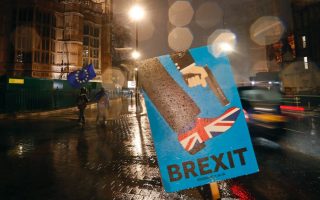Brexit in bad shape

The progress of the domestic politics of Brexit resemble a kaleidoscope in all but one thing. Tiny shifts in the position of the small particles inside the symmetrical mirror chamber result in ever changing views. Except that by now many would choose to describe this sequence of ever changing outlooks of the UK’s future in Europe not as kal- but as kak-eidoscopic.
So what does the Brexit kakeidoscope show as of Friday morning to a tired but very worried eye? First, Mrs May’s Brexit plan, already overwhelmingly defeated twice in the House of Commons (HoC), will, zombie-like, stage a further appearance in the coming week seeking the approval of the HoC.
This third reappearance is made possible by two other pieces which have moved in the kakeidoscope. First, the authorisation by the HoC of the government to ask the European Union for an extension of the Article 50 notice period which currently requires the UK to leave the EU by 29th March. The authorisation is either for a short extension to enable the implementation of the May exit plan or, if that plan is not voted, a long extension to enable the UK to decide what else it wants to propose. The second and crucial piece of movement in the kakeidoscope was the defeat in the HoC of the motion for a second referendum.
Kaleidoscopic images are possible both because of the shifting of small particles, but also because of the constant fixtures of the wider structure, provided in our metaphor by the EU. The EU can agree an extension to the Brexit day of 29 March, but only with the consent of all 27 of its remaining members. A long extension, much desired by European politicians, like Donald Tusk, who see in Brexit one of the many faces of European populism undermining the Union, can only plausibly be accepted if the outcome of the delay is likely to be different to the deal of today. And the deal of today is either Mrs May’s deal (if the HoC approves it next week) or no deal (if nothing happens before 29 March). With the second referendum out of the kakeidoscopic picture, European leaders will have to weigh the costs of a long and uncertain delay against the prospect of a UK uniting behind an alternative and acceptable plan in good time for everyone to work out the details. Nothing that has happened since the Brexit referendum was called in 2015 inspires confidence that the UK will be able to achieve this.
At the same time, the opponents of Mrs May’s Brexit plan within the Conservative Party and its Northern Ireland DUP ally, who have long fretted that her plan did not go far enough and betrayed the essence of Brexit, may be changing their mind. The possibility of a long delay cannot be ruled out and during this time further shifts in the kakeidoscope may even allow for a second referendum. After all, if Mrs May has the privilege of asking the HoC to vote three times on the same thing, why should one exclude a priori a second people’s vote? The spectre of a complete volte-face on Brexit may still make the most ardent Brexiteers reconsider their support for Mrs May plan and may yet enable it to rise from its ashes, phoenix-like.
The business community, to the extent it has not already made viable alternative plans or cut its losses, is also pressing for swift resolution. It is prepared to accept Mrs May’s far from perfect plan because the cost of uncertainty is having a heavy cost on the economy.
The second thing which emerges from a closer look at the kakeidoscope is that, notwithstanding the shifts and changes, one element is stuck and refuses to budge. The UK will leave the EU on 29 March without a deal, unless something happens in the meantime. And the only viable thing which could happen in the meantime is the resurrection of the already twice-dead plan of Mrs May. For ardent Brexiteers it is anathema because the so called “Irish back-stop” potentially forces the UK either to stay in the EU customs union or to set a hard border within the UK, thereby splitting it. For dye-in-the-wool Bremainers the plan is seen as a third class membership in the European family without any meaningful collateral benefits to outweigh the losses of exiting the Union. It is therefore likely that both ardent Brexiteers and dye-in-the-wool Bremainers will vote down Mrs May’s plan for a third time, the former in the hope either for the removal of the backstop or of a hard Brexit; the latter in the hope of a Brexit reversal.
The defeat of the proposal for a second referendum highlights something which is rarely acknowledged among Bremainers and all those who see Brexit as a defeat for both the EU and the UK. A significant proportion of members of the HoC are not prepared to reverse the Brexit decision, in many instances notwithstanding what they may personally believe. Both the defeat of the proposal for a second referendum and the double defeat of Mrs May’s plan should be seen in this light as well.
The risk of a no deal Brexit is therefore higher than is widely acknowledged. Parliamentary process means that only the government can propose legislation, making Mrs May’s plan the only thing on offer again and again. The fear of a Brexit reversal may have increased, but Brexiteers see the Irish back-stop as an EU Trojan Horse and are not minded to accept it. At the same time the Irish back-stop will always feature in anything the EU will accept by way of an orderly Brexit, because it goes to the essence of borderless trade and respect of international treaties of its members, in this case Ireland and the Good Friday Agreement.
So, if Mrs May’s plan is defeated again next week, will European leaders be prepared to prolong the Brexit agony for a long time and to what end? If the UK is unlikely ever to accept a solution which includes the Irish back-stop, and if the HoC has rejected another referendum, what is the point of an extension?
Perhaps we will know the answer soon as one day after the other forces a turn of the kakeidoscope, each time in the hope that it will turn out to be a kaleidoscope.
Yannis Manuelides is a financial partner at London law firm Allen & Overy





